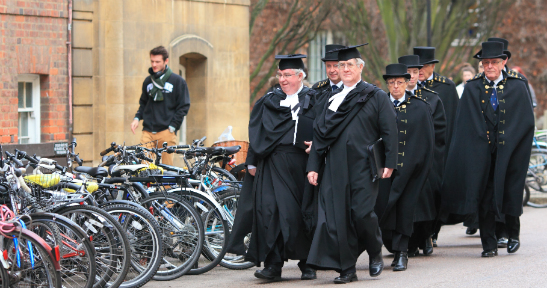
The two Proctors are elected in Congregation by the Regent House,
the University’s governing body, on 1 October (the next day if it is a Sunday) to
serve for one year. The candidates are
nominated by two of the Colleges acting in rotation and must have been members
of the Senate for at least three years. Whichever has been a member longest is
designated as Senior and the other as Junior. They are of equal standing, but
by regulation or custom have some different areas of responsibility.
The Proctors are assisted by two Pro-Proctors and two Deputies. Additional Pro-Proctors can also be appointed to assist them for particular purposes. The disparate nature of proctorial duties compared with the length of tenure often means in practice (and in accordance with the nominating procedure) that the deputy Proctors are the senior and junior proctors from the previous year, with the Pro-Proctors set to become the Senior and Junior Proctors the next year.
Duties
Formerly the Proctors had very extensive duties, but over time
many of these have been transferred to the Council, to committees, or to the
modern administration. Nevertheless, they represent the Regent House on all
public occasions, are ex officio
members of the Board of Scrutiny and certain other Committees, attend the
Council as observers and continue to undertake various important functions. They
must be present to hold a valid Congregation, where they oversee business and
submit Graces to the Regents, and they formally admit a new Vice-Chancellor into office in Congregation.
The Proctors and their University Constables (appointed under the Universities Act 1825) have traditionally been responsible for maintaining discipline within the University (but not the Colleges). They are particularly concerned with lawful freedom of speech and ensuring that University’s code made under Section 43 of the Education (No 2) Act 1986 is observed on University premises and at University meetings held within its precincts. They check that examination sessions are properly conducted.
The Junior Proctor is particularly concerned with University Clubs and Societies and has powers to resolve disputes arising from the Students' Union.